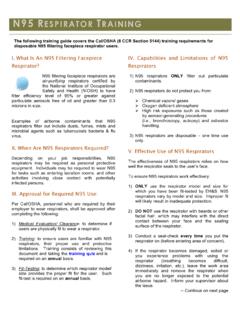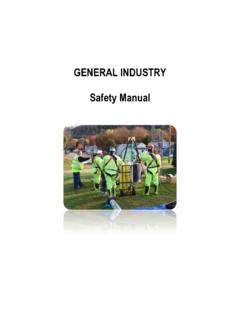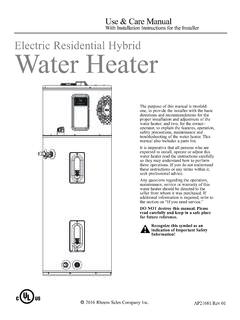Transcription of 1 WORKPLACE SAFETY INSPECTION CHECKLIST - Stanford …
1 1 Completed by: _____ Date: _____ Building: _____ Room: _____ Supervisor: _____ Phone: _____ Department: _____ Scheduled periodic inspections to identify unsafe conditions and work practices are supervisor requirements per Cal OSHA Title 8 CCR 3203(a)(4) and Stanford s Injury and Illness Prevention Program (IIPP). Stanford recommends completing the CHECKLIST on an annual basis. Completed copies shall be kept on file for at least one year by the supervisor or department SAFETY coordinator. Report any facility-related deficiencies below to the building manager.
2 1. GENERAL SAFETY YES NO N/A COMMENTS/DATE CORRECTED 1. WORKPLACE is clean and orderly. 2. Floors are clear and aisles, hallways, and exits are unobstructed. 3. Floor surfaces are kept dry and free of slip hazards. 4. Stairways, sidewalks, and ramps are free of defects ( damaged treads, frayed carpet). 5. Illumination is adequate in all common areas and workstations. 6. Emergency evacuation plans are posted at eye level in every stairway and elevator landing, and immediately inside all public entrances to the building.
3 7. All containers, including non-hazardous chemicals and wastes, are labeled with the full chemical or trade name. (For storage of hazardous chemicals, see below*) 8. Stored materials are secured & limited in height to prevent collapse. 9. 36 clearance maintained for electrical panels. 10. Electrical cords and plugs are in good condition with proper grounding. 11. Extension cords and power strips are not daisy-chained and no permanent extension cords are in use. 12. Portable electric heaters have at least 36 of clearance from combustible materials ( paper).
4 13. Equipment and machines are clean and working properly. 14. Adequate ventilation is provided to machines for preventing buildup of heat or gas emissions. 15. Emergency stop switches on machines are identified and in proper working order. 16. Mechanical safeguards are in place and in proper working order ( paper cutter guards). * If chemicals in the work area are stored in amounts greater than typical office/household quantities, you are required to complete the EH&S Laboratory INSPECTION CHECKLIST quarterly.
5 SEE NEXT PAGE WORKPLACE SAFETY INSPECTION CHECKLIST 2 August 2016 OHS 16-128 NO N/A COMMENTS/DATE CORRECTED exit signs are properly alarms and fire extinguishers are visible doors ( in stairways) are kept closed unlessequipped with automatic closing " vertical clearance is maintained below all extinguishers are serviced and stairways are kept free of obstruction andnot used for NO N/A COMMENTS/DATE CORRECTED , filing cabinets, shelves, racks, cages, storagecabinets and similar items over four feet tall are anchoredto the wall.
6 Refer to ProtectSU for has lips, bungees or other seismic machines or equipment are secured againstmovement using chains, lockable casters, or otherappropriate equipment is bolted down or secured to wallstuds to withstand accelerations typically expected in & heavy objects are stored on lower shelves orstorage equipment sensitive to shock damage , such asinstruments, computer disks and glassware are stored inlatched cabinets or otherwise secured to prevent areas are uncluttered providing clear evacuationroutes in the event of an and lockers are equipped with positive latching orsliding INFORMATION/COMMENTS (as needed).






